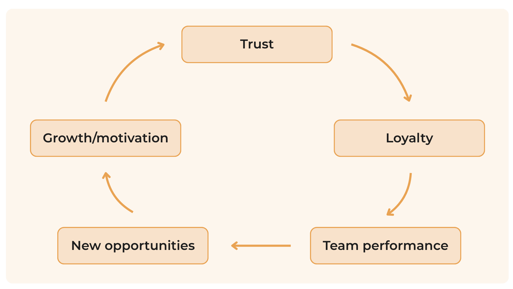Why Soft Skills Matter in Project Management
In Project Management, soft skills are often what determine whether a project simply meets its goals, or truly succeeds. Technical expertise, also known as hard skills (using frameworks like PRINCE2® or Agile) are of course essential - but they only take you so far. What can really drive innovative progress is the human interactions that happen outside of the project tools: the communication, influence, decision-making, and leadership that move people and tasks in the same direction.
Projects are, at their core, about people. As a Project Manager, you’re not just managing tasks or timelines - you’re motivating teams, resolving conflicts, and building trust with a wide range of stakeholders. In the UK specifically, there’s an increasing demand for human-centred abilities.
Fact: Soft Skills Are Considered the Most Important For Project Delivery
In a poll of 500+ Project Management professionals by the Association for Project Management, soft skills were ranked as the most important factor for ensuring successful project delivery.
Team management leadership (15%), communication and interpersonal skills (15%), and adaptability/flexibility (14%) were highlighted as especially crucial by respondents.


Which Soft Skills Are Most Important for Project Managers?
When we speak to hiring managers and students preparing for a thriving career in Project Management, the same six soft skills repeatedly emerge as essential for success:
-
Communication and active-listening: Effective communication is arguably the cornerstone of every project. Active-listening and clear communication help you align stakeholders, avoid conflict, and get buy-in from colleagues. Your ability to tailor your message to different audiences - from technical teams to executives - has a huge impact on outcomes.
-
Leadership and team motivation: Modern Project Managers don’t just delegate - they inspire. Leadership today is about creating trust, empowerment, and accountability. Recognising effort, developing others, and fostering collaboration all contribute to a resilient, high-performing team. Whether you’re a Project Coordinator or seasoned Project Manager, leadership soft skills are key.
-
Emotional intelligence: Understanding emotions - your own and others’ - helps you navigate complex interpersonal situations, manage stress, and keep your team aligned under pressure. Emotional intelligence is key to maintaining morale and productivity through uncertainty.
-
Adaptability and resilience: Projects rarely run exactly to plan. As a result, the ability to pivot quickly, absorb change, and stay positive is invaluable for professionals in this sector. Employers actively look for adaptable and flexible Project Managers when hiring.
-
Decision-making and problem-solving: Ambiguity and shifting priorities are natural parts of the project managing process. What often sets great Project Managers apart from good Project Managers is the ability to make decisions decisively, balancing analytical reasoning, ethical judgement and instinct.
-
Time management: With so many moving parts, being able to prioritise effectively and remain calm under pressure ensures consistent progress. Strong self-management also models good behaviour for your team, maximising outputs.
These aren’t abstract qualities: they’re skills that can be learned, refined, and demonstrated. Strengthening your soft skills will improve your performance, credibility, influence - and consequently, your long-term career growth.

How to Develop These Soft Skills
You might wonder: “I know which skills are important, but how do I develop them?” The good news is you absolutely can - and it’s not just about being naturally good at it.
1. Real-world practice and reflection
Just like you would with a technical tool, you need to apply soft-skills in real settings - this could be by leading a meeting, resolving a conflict, or running a stakeholder workshop. Then, reflect: what went well, what didn’t, what else could I try?
2. Seek targeted training
You can build soft skills through structured learning - with a business skills course for example. You could also attend industry events and complete in-person training that is specific to developing soft skills.
3. Use feedback and coaching
Ask colleagues, team-members and stakeholders: “what’s one thing I could do to be a better Project Manager for you?” Regular 360-style feedback can help you identify your blind spots. Combine that with mentoring or peer-coaching and building new habits will become much simpler.
4. Document your progress
Keep a short journal or log of soft skills efforts, where you record your actions and their outcomes. Over time you’ll build a track-record of behaviour change, which you can also make use of for job applications. Completing a skills audit is a good first step when documenting your soft skills development.
5. Link soft skills to your technical credentials
As a Project Manager you’ll still need a solid knowledge of the frameworks (risk management, scheduling, budget control) - however, your ability to deliver is directly connected to your ability to lead, communicate and problem-solve. You can use your CV, cover letter and interviews to show how you synthesised soft skills and hard skills for great results - for example: “by using my AgilePM® training in combination with actively listening to stakeholders, I reduced costs by X%”.
Fact: AI-Lead Transformation Means Soft Skills Are More Important Than Ever
LinkedIn’s latest ‘Skills on the Rise’ report revealed that relationship building and strategic thinking rank more highly among employers than AI literacy.
AI is undoubtedly dramatically changing the Project Management sector - however, AI tools are not replacing human interaction, but rather enabling it.

Final Thoughts
If you’re making the move into Project Management or want to step up in your current role, it’s crucial to remember that the “soft” in soft skills doesn’t mean optional. Rather, it means subtle, human, relational - with huge impacts. Your technical ability will open the door - your soft skills will determine whether you or not you succeed, lead and progress.
Start making changes today to get ready for employers’ January recruitment drives. Choose one soft skill you’d like to improve (such as active-listening, leadership or conflict resolution) and commit to a small action this week. Over time, these incremental gains will help you stand out in the UK job market.
If you’d like help building your skills or want to explore how business skills training can support your ambitions, feel free to reach out. We’re here to help you through every step of your career journey.




